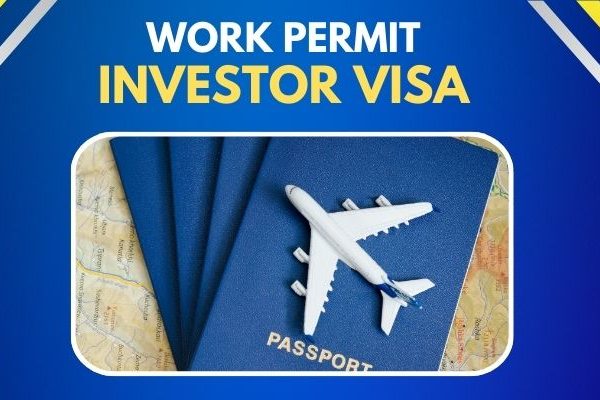- If you have any questions, please contact us!
- +84 965 624 065
- info@greennrj.com.vn

Differences Between Work Permit, Work Permit Exemption, and TRC in Vietnam- 6 Essential Facts
May 8, 2025
Complete Guide: Legal Requirements for Registered Business Address in Vietnam 2025 for Foreign-Invested Companies
May 9, 2025Work Permit vs Investor Visa: Which One Do You Need in Vietnam? 7 Essential Things (2025 Update)
1. Introduction
Work Permit vs Investor Visa in Vietnam is a key decision for foreigners who want to work or invest legally, choosing the correct type of legal status is crucial. This decision impacts how long you can stay in the country, what activities you are allowed to perform, and which obligations you must comply with. The two most commonly used legal pathways are the Work Permit and the Investor Visa.
Although both documents allow foreign nationals to live and work in Vietnam, each serves a different legal purpose and applies to different situations. This article will guide you step-by-step in understanding the differences and help you decide which option is best for your specific goals in Vietnam.
2. What is a Work Permit in Vietnam?
A Work Permit is a legal document issued by the Department of Labor, Invalids and Social Affairs (DoLISA), which allows a foreign national to be legally employed by a registered Vietnamese company or organization.
⚠️ Note: In Ho Chi Minh City, due to administrative restructuring in 2025, DoLISA has been merged into the Department of Home Affairs. Therefore, work permit applications in HCMC are now handled by the Department of Home Affairs. In other provinces, DoLISA remains the responsible authority.
If you are a foreigner who wants to work in Vietnam for more than 30 consecutive days or for more than 90 days in total within one year, you are required by law to obtain a Work Permit, unless you qualify for an exemption.
To apply for a Work Permit, you must be sponsored by a Vietnamese employer, and you must meet certain conditions regarding your qualifications, work experience, and health status. The employer is responsible for initiating the application and managing the procedure with the authorities.
3. What is an Investor Visa in Vietnam?
An Investor Visa, often referred to as a DT Visa, is granted to foreign individuals who invest capital into a company or establish their own business in Vietnam.
This type of visa allows investors to reside in Vietnam and legally participate in managing their business operations. Unlike the Work Permit, the Investor Visa is based on the amount of capital you contribute and your role as a company owner or shareholder.
There are four main categories of Investor Visas, which are defined according to the capital amount you invest:
- DT1 Visa: For investments of VND 100 billion or more, or for projects of national importance.
- DT2 Visa: For investments ranging from VND 50 billion to under VND 100 billion.
- DT3 Visa: For investments from VND 3 billion to under VND 50 billion.
- DT4 Visa: For investments under VND 3 billion.
Each type of visa has a different maximum validity period, with DT1, DT2 lasting up to 5 years, while DT4 is valid for only 1 year.
4. Key Differences Between a Work Permit and an Investor Visa
Understanding the differences between these two legal statuses is essential for compliance and business success. Below is a clear comparison:
|
Criteria |
Work Permit |
Investor Visa (DT) |
|
Purpose |
To work as an employee for a Vietnamese company |
To live and manage your investment/business in Vietnam |
|
Requires Vietnamese sponsor |
Yes – must be sponsored by a local employer |
No – you invest and own a company yourself |
|
Legal basis |
Labor Code and Decree 152/2020/ND-CP, 70/2023/ND-CP |
Law on Entry, Exit, Transit and Residence of Foreigners in Vietnam (No. 47/2014/QH13, amended 2019) |
|
Minimum capital |
Not applicable |
Required, depending on visa type (DT1–DT4) |
|
Allowed work activities |
Only with the sponsoring employer |
Only within your own company (management, ownership); not allowed to work elsewhere |
|
Permit validity |
Up to 2 years |
1 to 5 years depending on capital |
|
Extension |
Renewable |
Renewable |
In summary, the Work Permit is ideal for foreign employees, while the Investor Visa is designed for entrepreneurs, shareholders, or company founders.
5. How to Know Which One You Need
You should apply for a Work Permit if:
- You have been offered a job by a Vietnamese company.
- You are not a shareholder or owner of the company you work for.
- You are being sent to Vietnam by your overseas employer to work temporarily for a local entity.
- You will be working under a fixed contract with a Vietnamese business or organization.
You should apply for an Investor Visa if:
- You are contributing capital to start a business in Vietnam.
- You are listed as a legal representative or director of a company.
- You want to manage your own enterprise and stay in Vietnam long-term.
You wish to obtain a Temporary Residence Card (TRC) for 1 to 5 years without needing a Work Permit.
6. Step-by-Step Application Process for Each Option
Work Permit Application Process
- Obtain Approval for Using Foreign Labor
Your employer must submit a request to the provincial Department of Labor, Invalids and Social Affairs (DoLISA) explaining the need to hire a foreign worker.
Note: In Ho Chi Minh City, this is handled by the Department of Home Affairs due to the 2025 restructuring. - Collect Required Documents
These include your passport, health check, criminal record, university degree, work experience confirmation, and legalized documents.
- Submit Application to DoLISA
The employer submits the complete application package to the Department of Labor, Invalids and Social Affairs of the province or city where the company is located.
Note: In Ho Chi Minh City, submission is made to the Department of Home Affairs. - Receive Work Permit
If all documents are valid, the permit is issued within 10–15 working days.
Investor Visa Application Process
- Register Your Business
You must either set up a new company in Vietnam or invest in an existing one by contributing capital and becoming a shareholder.
- Receive Enterprise Registration Certificate (ERC)
This document proves your company is legally registered.
- Contribute Capital
You must transfer the full amount of registered capital into the company’s account.
- Apply for the Investor Visa (DT1–DT4)
Submit your passport, ERC, proof of capital contribution, and other required documents to the Immigration Department.
- Receive Visa or TRC
You will be granted a visa or a Temporary Residence Card, valid according to your investment tier.
7. Validity Periods and Extension Conditions
|
Visa/Permit Type |
Validity Period |
Extension Allowed? |
|
Work Permit |
Up to 2 years |
Yes |
|
DT1 Visa |
5 years |
Yes |
|
DT2 Visa |
5 years |
Yes |
|
DT3 Visa |
3 years |
Yes |
|
DT4 Visa |
1 year |
Yes |
The extension of both Work Permits and Investor Visas depends on compliance with the law and the continued existence of the employment contract or investment project.
8. Legal Question: Can Investors Work Without a Work Permit?
Yes — under Article 7 of Decree 152/2020/NĐ-CP, amended by Decree 70/2023/NĐ-CP, investors do not need a Work Permit if they meet ALL of the following:
- Are listed as legal representatives or capital contributors
- Have capital contribution of at least VND 3 billion
- Are actively managing the company
Important: If you are not a managing investor (e.g. silent investor or minor shareholder), or if you work in another company, you still need a valid Work Permit.
9. Practical Examples and Realistic Scenarios
- Scenario 1: John is hired as a Chief Engineer at a construction company in Ho Chi Minh City. He has no ownership in the company. → John needs a Work Permit.
- Scenario 2: Lisa decides to open a vegetarian café in Hanoi with an investment of VND 3.5 billion. She is the sole owner. → Lisa qualifies for a DT3 Visa and does not need a Work Permit.
- Scenario 3: Ahmed invests VND 100 million in a friend’s company but does not participate in operations. → He may get a DT4 Visa, but cannot work for the company unless he also obtains a Work Permit.
10. How Green NRJ Supports Foreigners in Vietnam
At Green NRJ, we specialize in helping foreign investors, professionals, and entrepreneurs comply with Vietnam’s legal framework. Our team offers:
- End-to-end support for Work Permit applications
- Consulting and document preparation for Investor Visa processing
- Assistance in company registration and capital contribution in Vietnam
- Legal advisory services to ensure full compliance with immigration and labor regulations
We take care of the bureaucracy so you can focus on achieving your goals in Vietnam. 📞 Contact us now for a free consultation!
11. Frequently Asked Questions (FAQs)
Q1: Can I convert my Work Permit into an Investor Visa?
A: Yes. If you decide to invest and establish a business, you can switch your legal status from employee to investor.
Q2: Can I hold both a Work Permit and an Investor Visa at the same time?
A: In some cases, it is legally possible, but each status comes with different rights and obligations. You should not use one status to perform activities covered by another.
Q3: Is there a minimum capital requirement for setting up a company?
A: While Vietnam does not have a general minimum capital requirement, immigration authorities expect a reasonable amount for your business sector. For DT3 eligibility, your capital must be at least VND 3 billion.
Q4: How long does it take to obtain a Work Permit or Investor Visa?
A: Typically, a Work Permit takes around 15 working days, while an Investor Visa can be obtained within 5–7 working days after company registration.




